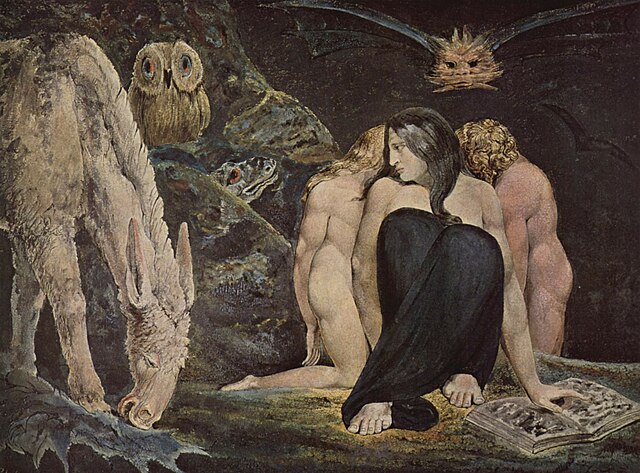In the mythological writings of William Blake, Los is the fallen form of Urthona, one of the four Zoas, and the embodiment of human creativity and inspiration. He is referred to as the "eternal prophet" and creates the visionary city of Golgonooza. Los is regularly described as a smith, beating with his hammer on a forge, which is metaphorically connected to the beating of the human heart. The bellows of his forge are the human lungs. Los's emanation, Enitharmon, represents spiritual beauty and embodies pity, but at the same time creates the spatial aspect of the fallen world, weaving bodies for men and creating sexual strife through her insistence upon chastity. In the Book of Urizen (1794), Los and Enitharmon have a child, Orc, who is the embodiment of the spirit of revolution. The name Los is, by common critical acceptance, an anagram of Sol, the Latin word for "sun". Los is also the plural form of El, an ancient Hebrew deity. Such innovations are common in many of Blake's prophetic poems.

Los, as depicted in The Book of Urizen, copy G, in the collection of the Library of Congress
Los' Spectre torments him at his smithy in Jerusalem. This image comes from Copy E. of the work, printed in 1821 and in the collection of the Yale Center for British Art
Two forms of Los with Enitharmon, Plate 100 of Jerusalem
Los with the child Orc and Enitharmon, in Blake's A Large Book of Designs. Produced c. 1796, this print is copy A of object 2 in the copy currently held by the British Museum.
Enitharmon is a major female character in William Blake's mythology, playing a main part in some of his prophetic books. She is, but not directly, an aspect of the male Urthona, one of the Four Zoas. She is in fact the Emanation of Los, also male. There is a complex verbal nexus attached. The Zoa Tharmas has emanation Enion, and Eni-tharm(as)-on is one derivation of her name. That should perhaps be read in the inverse direction though, as a construction of the Tharmas/Enion pair's names. Within Blake's myth, she represents female domination and sexual restraints that limit the artistic imagination. She, with Los, gives birth to various children, including Orc.
The Night of Enitharmon's Joy, 1795 William Blake





